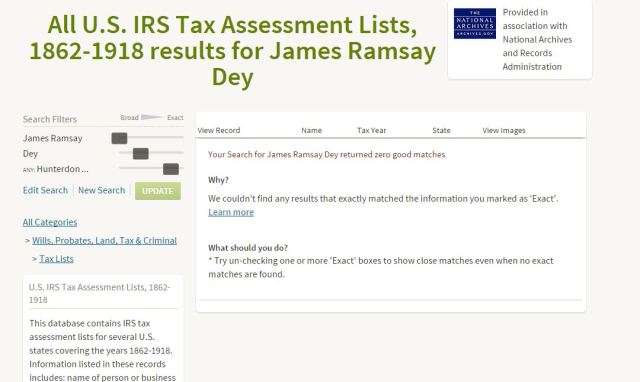I have recently been working with the Civil War Federal Tax Lists on Ancestry.com and on the off-chance you haven’t used them, I thought a quick overview might be beneficial. I have been surprised by how many of my ancestors could be found in the tax rolls and the various facts that they revealed. Here is an example of the taxes for Dr. Thomas Edgar Hunt. He was probably the most wealthiest of my distant relatives, so he was required to pay many different taxes on his income, carriages, watches, piano and his physician’s license:
History and Details of the Law
To raise money to finance the Civil War, Congress enacted an income tax for annual incomes over $600, taxes on licenses (doctors, lawyers, brewers, merchants, bankers, jugglers (yes jugglers and any slight of hand occupations) etc.), taxes on luxury items (watches, carriages, pianos, silver plate etc.) and monthly taxes on certain retail goods and services. During the war, this effected only states that were in the Union, but after the war, Southern states were taxed as well. A detailed article on the law can be found on the NARA website in Prologue Magazine.
Here is an example of one of my Southern ancestors, who after the war went into the retail and liquor business in Arkansas.
If your subject was poor, subsistence farmers or away at war, you probably won’t find your ancestors, but I found relatives I didn’t expect to who had luxury items or were tradesmen. So, check everyone who was in the U.S. during this period of time.
Index and Searching
The dates of the tax lists of 1862-1918 are misleading, as the later years of 1872-1918 really only include the states of Colorado, Wyoming, New Mexico and Arizona. The collection primarily references taxes for the period of 1862-1866. Find the states and date ranges of tax records included in the database here.
The index has some issues, so be sure to try multiple spellings of the last name, experiment without the first name if the last name is uncommon, and try with and without the county/state. If you find one relative, make sure you review the whole “District” for other relatives who might not be showing up in the index. Sometimes you will get too many results if someone has a common name for the area. I was looking for James Ramsay Dey in Hunterdon County and surrounding counties in New Jersey and got these results.
I narrowed down by Hunterdon County and got this:
He lived in Warren County in 1862-1863 (the county just northwest of Hunterdon) and moved to Hunterdon County sometime in 1864. The index did not show him in Hunterdon County, but by reviewing the district pages before and after my Hunt ancestors, I finally find him in Clarksville, Hunterdon County in the 1864 tax rolls.
Tax Districts
I wasn’t sure if I had the correct Bernard/Bernhardt Knorr from Buffalo, New York when I found this record. New York had many districts, so it isn’t clear from “Tax District 30” and the names in the location column that these people are actually living in Buffalo, Erie County, New York. I was able to confirm that I had the right district by checking this National Archives article for a breakdown of tax districts for each state (scroll down the list for the state and details). In case you are wondering why Bernhardt Knorr had 11 sheepskins? He was a tanner! It seems like an expensive tax to pay monthly and makes me think differently about his economic status. Perhaps he wasn’t as poor as I always thought.
Good luck and if you find something interesting about your family in the index, let me know!









Thanks Rachel. You are so smart and so detailed! My grandfather wasn’t in the Civil War but his older brother (by 20 years) was. He got paid for using his own horses in the war. I’m looking forward to this search. Btw – any more progress on your Mayflower Ancestry?
That is great that you have a record of your grand-uncle getting paid for using his own horses in the Civil War. I haven’t been working on my Mayflower ancestry, but Soule Kindred wants me to send in my family tree, so I guess I better make time for it.
Let me know if you find anything in the tax index for you family!
Surname variances can also be search on Ancestry using the * for a wildcard search, that sometimes reduces the number searches necessary to find what you’re looking for.
I’ve had some documentation on Ancestry randomly change, including the link to the specific content (before they were acquired). It was a record documenting my father-in-law’s first marriage. Luckily, I had copied that over to my private tree on my PC before that record changed but what concerns me is what else has changed that I haven’t noticed in my trees on Ancestry. I am am struggling to trust, and I am dissatisfied with the look of the new structure and how the entries in my tree function.
I haven’t noticed that happening on Ancestry…I feel insecure! I am slowly putting all my documentation into Legacy that I have gotten from Ancestry. Apparently I need to step it up!